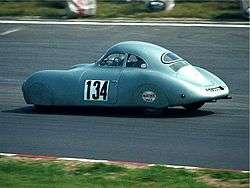Porsche 64


The Porsche 64, also known as the Type 64 and Type 60K10, is considered by many to be the first automobile from what was to become the Porsche company, as a true design precursor to the production model of after the war. The model number comes from the fact that it was built mainly from design drawings for the Type-64 "record car". Most mechanical parts came from the 38 prototype series. The chassis was heavily reinforced and the engine also reworked to produce around 40 horse power.[1] The Type-64 was only a drawing until the three racers were built. The body was also a compromise in that the cab had to look like a KdF car, but the rest was 'record' car. The VW beetle was the Type-60, and the name the "60K10" means body design 10 for the Type-60 Beetle. Its flat-four engine produced 50 bhp and gave a top speed of around 160 km/h (99 mph).
The body design was made by the Porsche Büro after wind tunnel tests for a planned V10 sports car that never came into existence, the Type 114. Dr. Porsche promoted the idea to enter the car into the 1939 Berlin-Rome race as a public relations ploy. Three cars were made in hand shaped aluminium by the bodywork company Reutter. One was destroyed early in World War II. The two remaining were used by the Porsche family. Eventually they only used one of them and put the other in storage. In May 1945 American troops discovered the one put in storage, cut the roof off and used it for joyriding for a few weeks until the engine gave up and it was scrapped. The last remaining Porsche 64 was owned by Ferry Porsche who had it restored by Battista Farina in 1947. In 1949 it was sold to the Austrian motorcycle racer Otto Mathé and with it he won the Alpine Rally in 1950. The last time he drove it in a race was at the Monterey Historic Races in Monterey, California, in 1982.
| Porsche road car timeline, 1948–1990s — next » | ||||||||||||||||||||||||||||||||||||||||||||||||||||
|---|---|---|---|---|---|---|---|---|---|---|---|---|---|---|---|---|---|---|---|---|---|---|---|---|---|---|---|---|---|---|---|---|---|---|---|---|---|---|---|---|---|---|---|---|---|---|---|---|---|---|---|---|
| Type | 1940s | 1950s | 1960s | 1970s | 1980s | 1990s | ||||||||||||||||||||||||||||||||||||||||||||||
| 8 | 9 | 0 | 1 | 2 | 3 | 4 | 5 | 6 | 7 | 8 | 9 | 0 | 1 | 2 | 3 | 4 | 5 | 6 | 7 | 8 | 9 | 0 | 1 | 2 | 3 | 4 | 5 | 6 | 7 | 8 | 9 | 0 | 1 | 2 | 3 | 4 | 5 | 6 | 7 | 8 | 9 | 0 | 1 | 2 | 3 | 4 | 5 | 6 | 7 | 8 | 9 | |
| Roadster & sports cars | 912 | 912E | 924 | Boxster (986) | ||||||||||||||||||||||||||||||||||||||||||||||||
| 356 | 914 | 944 | 968 | |||||||||||||||||||||||||||||||||||||||||||||||||
| 911 series | 911 | 911 / 930 | 911 (964) | 911 (993) | 911 (996) | |||||||||||||||||||||||||||||||||||||||||||||||
| GT | 928 | |||||||||||||||||||||||||||||||||||||||||||||||||||
| Supercar | 959 | 911 GT1 Straßenversion | ||||||||||||||||||||||||||||||||||||||||||||||||||
References
- ↑ Barber: Birth of the Beetle